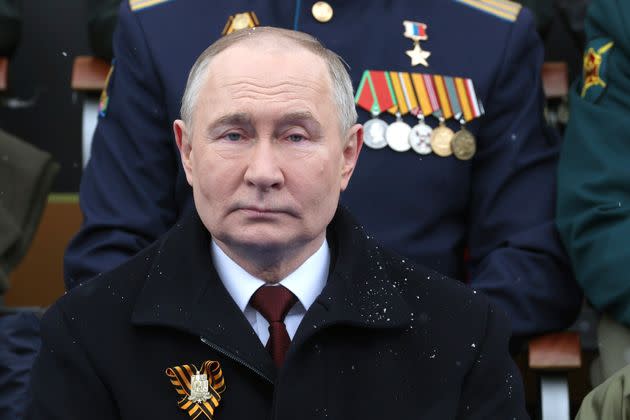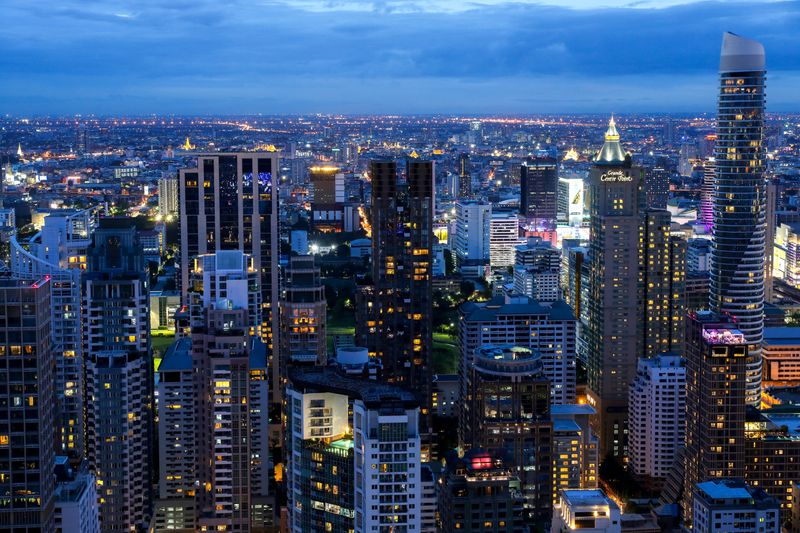
Considering the risks Vladimir Putin took in invading Ukraine 1,000 days ago, he does not really have that much to show for it.
The small amount of land he has managed to seize has come at a great cost to his army and to his country’s bank account.
While he is no longer completely isolated on the world stage – he now has North Korea’s leader Kim Jong Un by his side – Putin’s pretty far away from the outright victory he was looking for when Russia crossed Ukraine’s borders on February 24, 2022.
Of course, Kyiv is nowhere near besting Moscow in this war of attrition either, and it is still being targeted by Russian bombs on a regular basis.
But now the US has reportedly given Ukraine’s permission to use long-range missiles within Russia, could Kyiv finally get the upper hand to defeat Putin – or is Moscow in a stronger position than we realise?
What has Putin lost in his bid to seize Ukraine?
Personnel
Since the president first launched his invasion nearly three years ago, Russia has likely suffered more than 700,000 casualties in battle.
The UK’s Ministry of Defence (MoD) reported on Monday that October this year has been the “most costly month of the war for Russia”, with a total of 41,980 losses across those four weeks alone.
Despite these mounting casualties, Putin is only increasing the tempo of offensive operations, according to the MoD.
But the Russian public have made it very clear (via previous protests) they would not take kindly to another mobilisation wave, so the Kremlin has been forced to turn to North Korea to bolster its armed forces.
Putin has reportedly recruited as many as 100,000 of Pyongyang’s troops to fight for Russia.
These soldiers are said to be helping push the Ukrainians out of the Russian region of Kursk, after Kyiv seized it in August, in a sign of just how much Moscow is struggling.
As former defence secretary Ben Wallace told Times Radio: “Russia, people should understand, is frail.
“The great Putin has ended up going on bended knee to North Korea, a country that even Russia used to effectively ignore, begging for its poor citizens who are now being used as cannon fodder.”

Economy
Inflation is at 8.5% in Russia right now, and reports from the country suggest the economic strain is being felt everywhere.
Potatoes apparently cost around 64% more than they did at the start of the year, and even everyday goods like butter are now so valuable they are being stolen.
But Putin is now spending more than 40% of Russia’s public expenditure on defence and security – more than on education and health combined.
As Wallace told Times Radio: “Russia’s economy, which is heavily now committed to just funding the war machine, is much more fragile than they would like to think.”
UK defence chief Admiral Sir Tony Radakin also warned earlier this month: “The longer the war goes on for Russia, the more difficult it is.”
He added: “It will be OK this year, it can survive next year – if you look through next year and into 2026, the Russian economy is under more and more pressure.”
Land
Putin’s invasion of Ukraine was a land grab and meant to be over within a matter of days.
Almost three years later, and Russia controls just 20% of Ukrainian land.
That rate of progress is embarrassingly slow for Putin, a leader who aspires to recreate the old Soviet Union and rule over the world’s second largest army.
But Russia has only advanced between 30 and 40km into Ukraine’s territory since 2024 began.
As George Barros from the Institute for the Study of War told CNN: “To lose five divisions worth of tanks and other personnel carriers over the course of a year to only advance about 40 kilometres, you can go and compare this to all the other major mechanised offences of the 21st century and even the great battles of the Second World War …. that’s actually a really terrible performance.”
Meanwhile, Ukrainian troops are still in the Russian region of Kursk, having seized more than 1,200 sq km in August.
Three months later, and they’re still occupying around half of that space – another ongoing source of humiliation for Putin.
Does the Kremlin still believe it can win the war?
Despite these setbacks, there is no denying that Russia is far from withdrawing in Ukraine – and still believes it will eventually be victorious.
The ISW’s Russia analyst and deputy team lead Kateryna Stepanenko told HuffPost UK: “The largest problem facing Ukraine is the Kremlin’s ability to use information operations to erode Western and international support for Ukraine and control the dominant narrative about the war.
“The Kremlin believes that it can win this war by manipulating the centre of gravity for this war – namely Ukraine’s Western and international partners – in abandoning their military, financial, and humanitarian support for Ukraine.”
She warned that Moscow is consistently planting “false narratives that Russia is invincible or that Russia would be interested in negotiations”.
Alluding to the US’s initial reluctance to approve the use of long-range missiles in Russia, Stepanenko explained that these narratives “significantly slow down Ukraine’s partners’ decision-making”.
Barros warned Putin’s army has the initiative across the frontlines too, forcing Kyiv to take defensive positions.
Speaking to the channel before reports of the long-range missiles emerged, he added: “The Russians are the ones taking action, and they’re forcing the Ukrainians to respond.
“That’s not a good thing, because you lose wars by constantly being on the defensive… You just get boxed into a corner and you have to choose from a buffet of bad options.”
Could the US’s long-range missiles deal a fatal blow to Putin?
Joe Biden finally gave Ukraine permission to use US-supplied long-range missiles on targets within Russia on Sunday night, according to reports, sparking speculation that the UK and France will soon follow suit.
However, there is a cloud of doubt over just how much of an impact these US weapons, with a range of up to 190 miles, will have on the war.
It may be too late to substantially change the course of the fighting.Michael Kofman, Carnegie Endowment for International Peace
James Nixey, the director of the Russia and Eurasia programme at Chatham House, said the decision is part of Washington’s “drip feed” of support to Ukraine – and may be limited.
In comments sent to HuffPost UK, he said: “If it is true that the authorisation for usage extends only to the Kursk region (and is therefore primarily directed at North Korean troops); then, again, this fits the pattern, and means the overall effects on the war will be negligible.”
Nixey said it was “not a game changer” and explained: “That’s because short of wide-scale nuclear, radiological or biological weapons used by Russia, there’s no such thing. No panacea.”
He continued: “The only way Ukraine can be meaningfully helped is with incremental gains across the board: relaxation of all range limits, increased defence production and supply in Europe, tightening of sanctions loopholes, NATO troops on ground in Ukraine in support positions.”
Michael Kofman, a senior fellow at the Carnegie Endowment for International Peace in Washington, was similarly unimpressed by the move.
He told Reuters: “The decision comes late, and like other decisions in this vein, it may be too late to substantially change the course of the fighting.
“Long-range strikes were always one piece of the puzzle, and had been overly freighted with expectations in this war.”
But, that’s not to downplay the impact Ukraine’s allies could have on the conflict.
As Barros told CNN: “If the international Western coalition, including the United States, keeps backing the Ukrainians for the next maybe 12 to 16, 18 months, there will be opportunities to really disrupt the way that the Russians have been resourcing this war.
″[They] can decide whether the Russians win or lose.”
What about the ‘Trump effect’?

There’s widespread fear that Donald Trump’s impending return in the White House could turn events back in Putin’s favour, and hand him victory.
The Republican is known to be more sympathetic towards Putin – he memorably called the Russian president “genius” and “savvy” for invading Ukraine in 2022 – and they allegedly spoke to one another on multiple occasion after Trump’s first term ended.
As Nixey told HuffPost UK: “The Biden administration’s objective is not to win the war; it is to not escalate the war. This has not changed.”
Trump’s incoming administration, on the other hand, has already made it plain it just wants the war to end, conscious of the ongoing cost it is having on the US’s finances.
It could easily withdraw US permission to use the long-range missiles, and possibly the extensive funding it gives to Kyiv ($175bn of aid since February 2022).
Even though the US is Ukraine’s most powerful ally, the president-elect has not said which side he wants to win the war.
But, the early moves Trump is making with his administration certainly suggest he is not exactly dedicated to Ukraine’s cause.
He wants Tulsi Gabbard to be his next director of national intelligence, a politician who has been accused of trying to amplify Moscow’s propaganda and was once called a “Russian asset” by Hillary Clinton.
Then there’s Trump’s new adviser, billionaire tech tycoon Elon Musk, who sat in on a call between the president-elect and Ukrainian president Volodymyr Zelenskyy last week.
After the Ukrainian president told local radio that the US could not force his country to “sit and listen” at the negotiating table this week, Musk replied to the clip on social media claiming the Ukrainian president’s sense of humour “is amazing”.
There are fears Trump will force Kyiv to cede occupied land to Russia in a bid to end the conflict, even though that is one of Ukraine’s red lines.
When Trump’s election was confirmed, even Zelenskyy admitted that the war will end “faster” now as a result.
And despite 1,000 days of war, Putin’s goals have not changed. He still wants to demilitarise Ukraine and replace Kyiv’s leadership with one which bends to Moscow’s will.
The Russian president has not yet been deterred by economic pressures, very slow progress on the ground or enormous personnel losses – suggesting something rather drastic might be needed to bring this drawn out conflict to a close.
Related…
EMEA Tribune is not involved in this news article, it is taken from our partners and or from the News Agencies. Copyright and Credit go to the News Agencies, email news@emeatribune.com Follow our WhatsApp verified Channel




